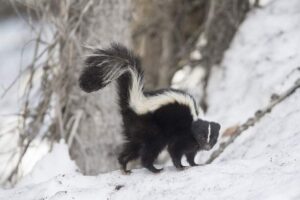Hunkering Down for the Winter
When skunks become scarce in winter they are not hibernating, they are merely less active, eating little and sleeping a lot. During the coldest months, they enter a state of torpor - a deep sleep where their metabolism, body temperature and breathing drops, but it is not full hibernation and they will wake up from time to time. Skunks don’t hoard food in their dens. They binge eat in the fall to create a thick layer of fat underneath their skin. This fat keeps them warm during the winter and is metabolized when the skunk is dormant. Since they don’t stockpile food, skunks will leave their dens occasionally for nighttime foraging. They generally eat berries, nuts, insects, earthworms, snakes, frogs, and other small animals. And of course, our garbage. While other food sources are scarce in winter, there is always a regular supply of garbage around people, and this makes nesting near houses a very attractive option for skunks.Cozy Dens
Skunks do not limit themselves to a single, they will move to a number of different dens during the year. This means that just because you don’t have skunks on your property in summer, doesn’t mean they won’t move in for the winter. Skunks can dig their own dens, but they prefer to look for nice snug spaces that someone else has created. In the wild, this might be an abandoned fox den, but in urban areas, it could easily be under your porch, deck or garden shed. Skunks will prepare their dens for the winter by blocking the entrance with leaves and grass to keep the cold air out. They are usually solitary animals but will share a den for extra warmth. Even males, that do not tolerate each other for most of the year, can den together in winter.Bad Houseguests
Skunks may appear fluffy and cute but a having one on your property is no joke. They rummage through garbage and wreak havoc in your garden. They can also cause damage to your home. They will burrow under any structure without a foundation, like a deck or garden shed, causing it to become unstable or collapse. The noxious odor emitted by skunks can linger for weeks and can be so unpleasant that it causes nausea and vomiting. It is extremely hard to remove skunk spray from clothes, skin or pet hair and if it enters your ventilation system it can quickly spread throughout the building.



